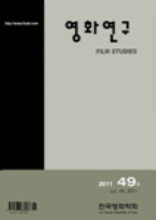- 영문명
- Rebel with a Cause: Teen Movies in the 1980s
- 발행기관
- 한국영화학회
- 저자명
- 정민아
- 간행물 정보
- 『영화연구』제49호, 331~351쪽, 전체 21쪽
- 주제분류
- 예술체육 > 예술일반
- 파일형태
- 발행일자
- 2011.09.30
5,320원
구매일시로부터 72시간 이내에 다운로드 가능합니다.
이 학술논문 정보는 (주)교보문고와 각 발행기관 사이에 저작물 이용 계약이 체결된 것으로, 교보문고를 통해 제공되고 있습니다.

국문 초록
영문 초록
This paper is to survey the conditions of teen movies from 1989, when Happiness Does Not Come In Grades was made, to 1991, when The Marriage Life kicked off the fad of romantic comedy, and probe into the nature and meaning of those films. During the time Korea’s film industry, facing direct competition with films made in Hollywood, was forced to find an escape route. In order to survive the competition, it was in the process of making changes such as recruiting new personnels, searching new ways to finance and seeking new ways to produce and distribute films. In late 1980s Korea’s film industry was experiencing drastic change of situation like opening its market to foreign products as the Korean society was rapidly transforming itself into a consumer capitalism. That is when the phenomena of teem movies surfaced again, and just like in 1970s its fad survived only a few years. What distinguishes the teen movies of 1980s from the ones of 1970s such as Yalkae series or Never never series is the fact that those of 1980s actively reflected the social problem and suggested a way of solving teenagers’ agonies, so they enjoyed much attention from teenagers and continuous production. Happiness Does Not Come In Grades was the one that opened the gate. The teen movies produced in early 1990s commonly had characteristics like long titles, small pool of actors and actresses, development of story mixed with critical perspective towards the harsh reality of school and comical elements, and similar episodes. The teen movies seem to have been a mixed territory of newly introduced rational planning and production, and outdated mode of production without any clear plan. We can say the teen movies of this period led introduction and experiment of various genres of films that flourished in so-called the Renaissance period of Korean films from the late 1990s through 2000s. Among the films made in this short period only two, Happiness Does Not Come In Grades and Our Class Accepts Anyone Regardless of Grade, stand out, as many other similar films seem to have been produced with no distinctive qualities. Analyzing styles presented by Happiness Does Not Come In Grades and Our Class Accepts Anyone Regardless of Grade, I hope to specify the features and merits of the 1980s’ teen movies. The two films share with many other films the element of teenagers’ ‘revolt’ at home and school, but they actually ‘revolted’ against the 1980s’ mainstream commercial films not just in story but in stylistics. And I analyze the two films from the viewpoint of stylistic ‘revolt.’
목차
1. 들어가며
2. 1980년대 후반의 사회상과 하이틴영화의 제작
3. 1980년대 후반 하이틴영화의 경향
4. <행복은 성적순이 아니잖아요>와 <꼴찌부터 일등까지 우리 반을 찾습니다>의 스타일적 반항
5. 결론
키워드
해당간행물 수록 논문
참고문헌
관련논문
예술체육 > 예술일반분야 BEST
- 생성형 AI 도구와 디자이너의 협업 프로세스 개발 - 이미지를 통한 아이디어 확산에서 고해상도 렌더링까지
- ‘일과 삶의 균형(Work-Life Balance)’ 척도 개발을 위한 연구
- 디자인 전공 교과목에서의 생성형 AI 도구 활용 사례 연구
예술체육 > 예술일반분야 NEW
- 한국영화의 촬영과 조명 시리즈 2: 영화 '형사, Duelist'의 Visual Concept 및 조명플랜
- 포스트모더니즘적 영상표현에 관한 연구 -실사 영화와 애니메이션 영화의 상호작용을 중심으로-
- 소니 HVR-Z1N 카메라의 중요한 메뉴에 관한 소고
최근 이용한 논문
교보eBook 첫 방문을 환영 합니다!

신규가입 혜택 지급이 완료 되었습니다.
바로 사용 가능한 교보e캐시 1,000원 (유효기간 7일)
지금 바로 교보eBook의 다양한 콘텐츠를 이용해 보세요!



